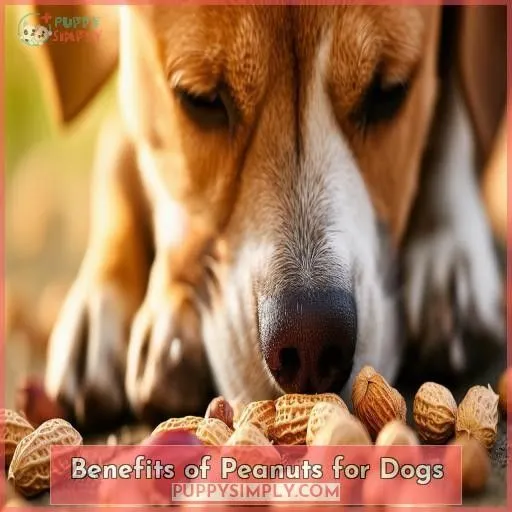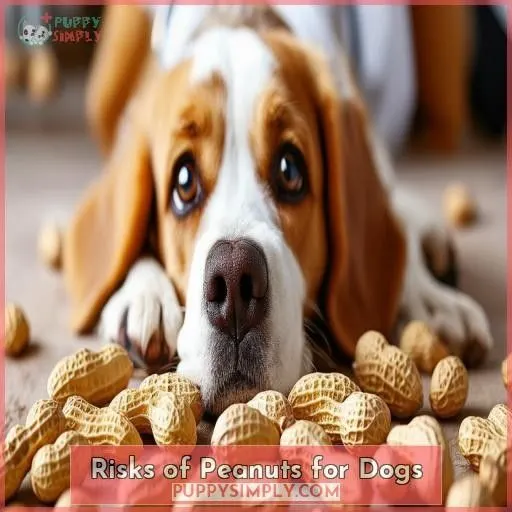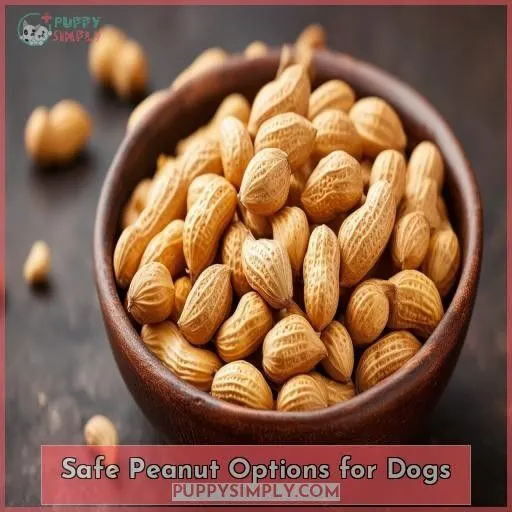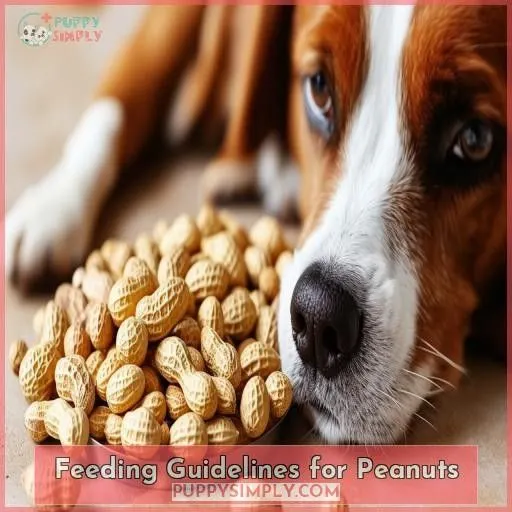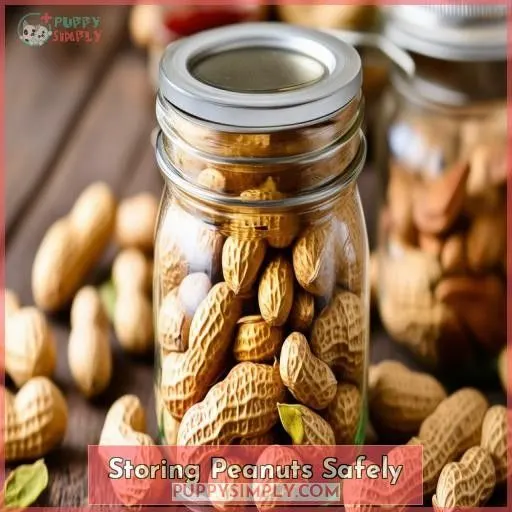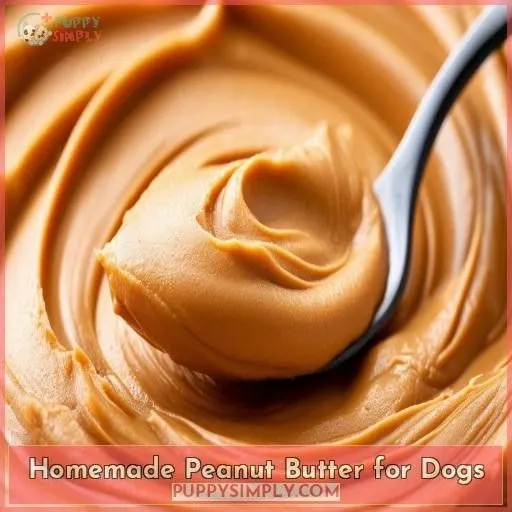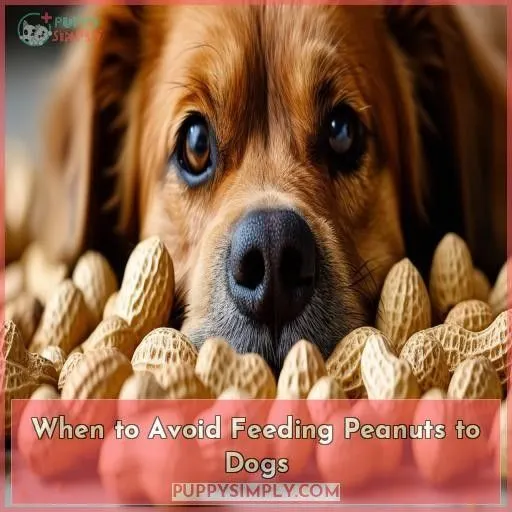This site is supported by our readers. We may earn a commission, at no cost to you, if you purchase through links.
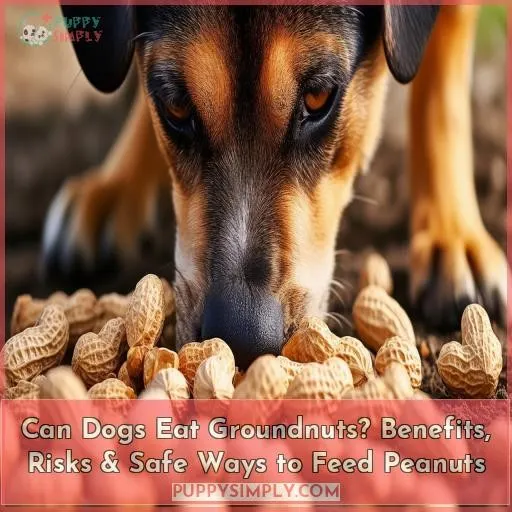 Peanuts are non-toxic and you can absolutely feed your pup groundnuts (peanuts) as an occasional treat.
Peanuts are non-toxic and you can absolutely feed your pup groundnuts (peanuts) as an occasional treat.
They provide protein, vitamins B6 and E, plus other nutrients.
However, moderation is key.
Their High fat content can lead to pancreatitis and obesity.
Stick to unsalted, dry-roasted or raw peanuts without shells or added flavors.
Remove shells beforehand to prevent choking hazards.
Skip the peanut butter if it contains xylitol, which is toxic for dogs.
While peanuts offer benefits, you’ll want to limit them to avoid potential issues down the line.
Table Of Contents
- Key Takeaways
- Can Dogs Eat Groundnuts?
- Benefits of Peanuts for Dogs
- Risks of Peanuts for Dogs
- Safe Peanut Options for Dogs
- Feeding Guidelines for Peanuts
- Peanut Allergies in Dogs
- Storing Peanuts Safely
- Homemade Peanut Butter for Dogs
- When to Avoid Feeding Peanuts to Dogs
- Frequently Asked Questions (FAQs)
- Conclusion
Key Takeaways
- Unshell the peanuts: Prevent choking hazards by removing the shells before giving peanuts to your furry friend.
- Moderation is key: Peanuts are a treat, not a staple. Limit intake to avoid digestive issues and weight gain.
- Avoid salted and flavored peanuts: Stick to unsalted, dry-roasted, or raw peanuts to keep your pup healthy and happy.
- Consult your vet: Every dog is unique. Chat with your vet to determine the best way to introduce peanuts into your dog’s diet based on their size, breed, and health needs.
Can Dogs Eat Groundnuts?
Yes, dogs can safely eat groundnuts (peanuts) in moderation as an occasional treat.
However, it’s important to understand the potential risks and feed them in a safe manner. Peanuts aren’t toxic to dogs, but their high-fat content can lead to pancreatitis and obesity if consumed excessively.
Additionally, be wary of commercial peanut butters containing xylitol, a sweetener toxic to dogs.
When feeding peanuts to your furry friend, stick to unsalted, dry-roasted, or raw varieties without any shells or added flavors.
Always monitor portion sizes and consult your veterinarian for specific recommendations based on your dog’s size, breed, and health condition.
Benefits of Peanuts for Dogs
While peanuts can provide dogs with beneficial nutrients like protein, healthy fats, and various vitamins and minerals, their high fat content means they should only be given in moderation as an occasional treat. You’ll also want to watch for any signs of allergies, as rare cases of peanut allergies in dogs have been reported.
Nutritional Benefits
Peanuts offer nutritional perks for pups, containing:
- Vitamin B6 for healthy brain function
- Vitamin E, an antioxidant
- Protein for energy
However, you must select high-quality, xylitol-free nuts to avoid potential risks like aflatoxin exposure or pancreatitis.
Moderation Key
You’ll want to keep your pup’s peanut intake moderate. While peanuts offer nutrients, their high fat content can lead to digestive issues like:
| Symptom | Mild | Moderate | Severe |
|---|---|---|---|
| Vomiting | X | X | X |
| Diarrhea | X | X | |
| Lethargy | X |
Too many peanuts may cause pancreatitis, so moderation is key.
Allergy Concerns
You should also be aware of potential peanut allergies in dogs. While rare, they can occur and cause:
- Skin irritation
- Respiratory issues
- Diarrhea
- Vomiting
Monitor your dog closely for any adverse reactions after introducing peanuts to their diet.
Risks of Peanuts for Dogs
Though peanuts offer some nutritional benefits for dogs, there are risks you’ll want to be mindful of.
The high fat content can potentially lead to pancreatitis and digestive issues like vomiting or diarrhea with excessive consumption.
Salted peanuts contain excessive sodium which could result in sodium poisoning.
The shells pose a choking hazard if not removed properly.
Additionally, regularly feeding peanuts substantially increases the likelihood of obesity and other weight-related problems in dogs.
Safe Peanut Options for Dogs
Regarding safe peanut options for dogs, it’s prudent to choose unsalted, dry-roasted or raw peanuts without shells. Boiled peanuts can be a sporadic treat if they’re unsalted and unseasoned.
Ensure the removal of shells before feeding to avert a choking hazard.
For peanut butter, opt for unsalted varieties devoid of added sugars or xylitol, a toxic sweetener for dogs. Homemade peanut butter is an excellent alternative to regulate ingredients.
Honey-roasted or flavored peanuts should be avoided as the added ingredients can be detrimental.
Feeding Guidelines for Peanuts
When feeding peanuts to your dog, it’s imperative to restrict them to limited quantities as occasional treats and refrain from giving them daily. Additionally, ensure you remove the shells before feeding to prevent potential choking hazards, and consult with your veterinarian for specific recommendations based on your dog’s size, breed, and overall health.
Limit Peanuts to Small Quantities as Occasional Treats
While peanuts offer some benefits, they’re best given in small amounts as treats. Here are some tips:
- Limit to 1-2 peanuts per treat
- Avoid peanut butter with xylitol
- Consider homemade peanut butter treats
- Watch for digestive issues like pancreatitis
- Don’t overfeed to prevent pet obesity
Avoid Feeding Peanuts Daily
While occasional peanut treats are okay, you’ll want to avoid feeding them daily. Too many peanuts can lead to weight gain, potential allergies, and even toxic reactions in dogs with low peanut tolerance.
Remove Shells Before Feeding to Prevent Choking
Before feeding your pup peanuts, remove the shells to prevent a choking hazard. Opt for high-quality, unsalted peanuts, and store them properly.
Consult With a Veterinarian for Specific Recommendations
While removing shells prevents choking, you should also consult your veterinarian for safe feeding tips. They can provide personalized recommendations based on your dog’s:
- Breed and size
- Age and health status
- Existing allergies or intolerances
Peanut Allergies in Dogs
Peanut allergies in dogs are extremely rare, with only one confirmed case reported. However, it’s still important to monitor your furry friend after introducing any new food, including peanuts. Allergic reactions can manifest as digestive issues, skin irritation, or respiratory distress. Some breeds may have a genetic predisposition to food sensitivities.
| Symptom | Mild | Moderate | Severe |
|---|---|---|---|
| Digestive | Gas, Diarrhea | Vomiting, Abdominal Pain | Bloody Stool |
| Skin | Itchiness, Hives | Rash, Swelling | Anaphylaxis |
| Respiratory | Sneezing, Runny Nose | Wheezing, Coughing | Breathing Difficulty |
If you notice any concerning symptoms, discontinue feeding peanuts and consult your veterinarian immediately. With caution, most dogs can enjoy peanuts as an occasional treat.
Storing Peanuts Safely
Although peanut allergies in dogs are extremely rare, you’ll still want to keep a close eye on your pup after their first taste.
If they show no adverse reaction, you can safely incorporate peanuts into their diet – but in moderation.
To keep peanuts fresh and prevent spoilage, store them in an airtight container at room temperature away from heat and moisture.
Spoiled peanuts can make your dog sick, so check for an off smell or discoloration before feeding.
Keeping peanuts properly sealed will maximize their shelf life and guarantee a tasty, nutritious treat for your furry friend.
Homemade Peanut Butter for Dogs
You can make your own peanut butter at home to guarantee it’s safe for your furry friend.
Homemade peanut butter allows you to control the ingredients, eliminating any additives that could harm your pup. Simply blend plain, unsalted peanuts until smooth.
Avoid using peanuts from bulk bins due to potential aflatoxin fungus contamination. Opt for human-grade peanuts instead.
Homemade peanut butter is ideal for allergy prevention as you can verify it’s xylitol-free.
Just remember, peanut butter is high in fat, so moderation is key. Feed your dog just a spoonful occasionally as a special treat.
When to Avoid Feeding Peanuts to Dogs
While peanuts can be a tasty treat for dogs, you’ll want to avoid feeding them peanuts if your furry friend has allergies or is overweight.
The high fat content in peanuts can trigger pancreatitis, especially with regular consumption.
Always check peanut butter labels for xylitol, a sweetener toxic to dogs that can cause liver failure.
Whole peanuts with shells pose a choking hazard, so be sure to remove the shells first.
If Fido gobbles down too many peanuts, obesity and digestive issues could arise.
When in doubt, Consult your vet for customized feeding guidelines based on your pup’s specific needs and health status.
Frequently Asked Questions (FAQs)
Is groundnut good for dogs?
Aye, picture a jolly pup gnawing on groundnuts! In moderation, these nutty treats offer pups essential nutrients like vitamin B6 and potassium. Just make certain they’re unsalted, unshelled, and served sparingly to prevent digestive woes.
What nuts are toxic to dogs?
You’ll want to avoid giving your pup macadamia nuts, black walnuts, and hickory nuts—they’re highly toxic for dogs. Almonds, pecans, and pistachios can also cause issues like digestive upset or obstructions if consumed in large quantities.
How many peanuts can a dog eat?
Imagine a handful of golden coins; that’s about how many peanuts your dog can safely eat—around three to five unsalted, dry-roasted peanuts, avoiding shells and flavors, to prevent health risks and guarantee moderation (Source).
Can dogs eat ground up nuts?
Yes, dogs can eat ground-up nuts, but make certain they’re unsalted, unflavored, and given in moderation. Peanuts and certain other nuts like cashews and almonds are safe, but avoid macadamia nuts and others that are toxic .
Are boiled peanuts safe for dogs?
Boiled peanuts, if unsalted and unseasoned, are safe for dogs. Always remove the shells to prevent choking and avoid Cajun spices. Limit intake to prevent digestive issues and consult a vet for personalized advice (Source).
Can peanut butter cause weight gain?
Yes, peanut butter can cause weight gain in dogs if you feed it regularly due to its high-fat content. Always monitor portions and consult your vet for guidance on safe quantities specific to your dog’s needs (Source).
How to introduce peanuts to puppies?
Introducing peanuts to puppies starts by offering small amounts of unsalted, plain, and shelled peanuts. Always monitor for allergic reactions, avoid flavored varieties, and consult your vet to confirm safe, moderate intake specific to your pup’s needs .
Do peanut shells pose a choking risk?
Yes, peanut shells pose a choking risk for dogs. They’re difficult to digest and can also cause intestinal blockages. Always remove the shell before giving peanuts to your dog to guarantee their safety .
Can dogs have peanut butter every day?
Dogs shouldn’t have peanut butter every day. While it’s a tasty treat, moderation is key to avoiding health issues. Limit intake to occasional treats, ensuring the peanut butter is unsalted and xylitol-free .
Conclusion
Peanuts, like tiny pockets of nutrients, can be a rewarding treat for your dog when given in moderation. They offer valuable protein, vitamins, and minerals, enriching your pup’s diet.
However, always be mindful of the risks, such as allergies and obesity. Make certain you stick to unsalted, dry-roasted, or raw peanuts without shells or added flavors.

